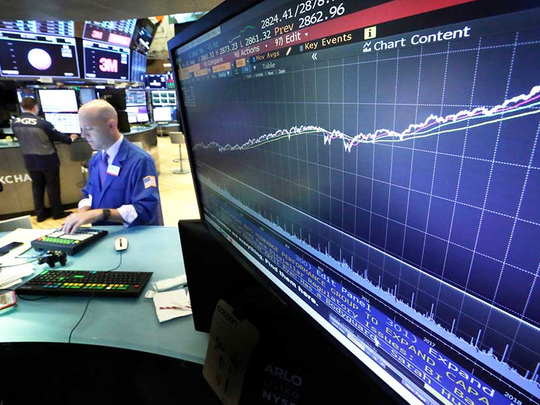
Dubai: Investors will hope for more clarity on whether trade ties between the US and China have actually improved, even as analysts voice concerns over how markets have been relatively unsurprised by developments so far. Stocks ended largely in negative territory last week, particularly indices in the Americas, Europe, Middle East and Africa.
The S&P 500, Nasdaq 100 and Dow Jones all fell as trading resumed after the Thanksgiving break, with shares of energy and consumer goods firms seeing the biggest declines. MSCI’s all-country world index, which tracks shares in 49 countries, shed 0.39 per cent on Friday, with overall trading 15 per cent below the 30-day average, in keeping with the year-end period when trading turns generally muted.
Markets are expected to open lower again this week as trade talks between the top economies remain under fire after China warned of “firm counter measures” against US President Donald Trump’s call to endorse a bill backing protesters in Hong Kong. This could potentially derail any progress made so far.
Less prone to news cycles
Analysts say the buy-sell volatility seen after every bit of good and bad news has been on the decline and will continue to be so until they see something concrete. “With stock markets already at record highs, and a number of potential stumbling blocks still to navigate if a phase one deal is to be reached by December 15, investors will likely want to see more concrete developments than an off-the-cuff statement from a President under pressure at home and desperate for good news,” said Daniel Marc Richards, MENA economist at Emirates NBD.
MSCI’s upturn
The MSCI world index climbed 2.5 per cent last month and 20 per cent this year, helped by whatever progress has been made on the trade war, which has roiled financial markets and disrupted supply chains. However, with global growth slowing and debt inflating, Anita Yadav, CEO at Century Financial, said central banks will not be able to raise interest rates, which would directly affect growth.
“This is primarily because a half per cent increase in interest rate will most likely give the same results as a 2 per cent increase in interest rate it gave 10 years ago, simply because the magnitude of debt is more,” added Yadav, speaking at the “Global Investor Outlook 2020’ in Dubai.
“The time of double-digit interest rates is gone. As an investor, what this means is that the risk-return on your portfolio is probably going to be in the low single-digit in the next decade versus what you were used to, which was either high single-digit or double-digit.”
Haven search
Safe-haven assets such as gold and currencies continue to look promising for investors, as oil faces declines. “We know the dollar is a key growth driver,” said Michael Hewson, chief market analyst at CMC Markets (UK), at the investor forum. “On its part, it would be in OPEC’s best interest to keep oil prices stable because the global economy cannot absorb higher oil prices vis-a-vis the global growth trajectory.”
The Dubai and Abu Dhabi stock markets are closed on account of UAE National Day holidays and will resume on December 4. Both ended last month deep in the red, with Dubai’s DFM dropping over 2 per cent and Abu Dhabi’s ADX declining nearly 1 per cent.












